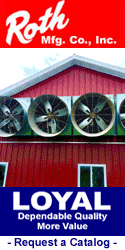 |
 |

|
|
|
Kentucky Ag News Headlines |
 |
February is National Pet Dental Health Month
Kentucky Ag Connection - 02/20/2018
A lot of time and thought goes into keeping your pets healthy and happy, but there is one aspect of their health you might be forgetting: their dental health. In 2017, PetFirst Pet Insurance, Louisville, Ky., reported nearly a quarter of a million dollars in claims for
gingivitis and periodontal disease and those are just two examples of common dental health issues in dogs and cats.
"We hope 'National Pet Dental Health Month' will draw attention to the potentially serious health issues for pets. All pet owners should start a regular dental care routine for their animals," said J Trudeau, PetFirst's Claims Supervisor. "Something as simple as
bad breath can lead to a life-threatening condition if left untreated."
These health issues can be avoided with regular checkups and good oral hygiene.
Brushing your dog or cat's teeth might sound silly, but it's an excellent way to prevent plaque buildup. While you don't need to brush your pet's teeth daily, the more often they get brushed, the better! A goal of once per week is a great place to start. Most pets
aren't too fond of the idea at first, but you can easily train them to have their teeth brushed. Here are a few things you will need to begin:
- Pet toothbrush: A human toothbrush works well just make sure to choose a soft one in a size to match your pet's mouth. Canine toothbrushes are more angled and also come in a fingertip style, which slips over the end of your finger. Choose the kind most
comfortable for you and your pet.
- Canine toothpaste: Your pet needs toothpaste that is safe to swallow, so that rules out human toothpaste that contains toxic ingredients. Plus, your pet will probably prefer the poultry or seafood options.
- Wipes or pads: When there's no time for full brushing, wiping their teeth and gum lines will whisk away some bacteria and food.
Dental treats are made specifically to remove plaque buildup and often contain ingredients that freshen breath and clean their mouth. Also, most chew toys have teeth-cleaning properties. Whether your pet is chewing on something natural like rawhide or an
artificial bone made of rubber or nylon, the act of chewing is beneficial for your pet's oral health. The gnawing scrapes plaque off your pet's teeth, and many all-natural treats made from meat and fish contain enzymes that help promote dental health.
Getting your pet's teeth cleaned professionally is by far the best way to ensure their health, but it isn't always the cheapest. Your veterinarian knows what is best for your pet's teeth and will be able to address any issues found. We suggest making an appointment
with your veterinarian for a professional exam at least once a year.
Good dental care, both at home and from a professional, is a big part of keeping your pets healthy. With some patience and dedication, it can easily become a part of your lifestyle.
|
 |


|
 |
|
Copyright © 2024 - Farms.com. All Rights Reserved. |
 |
|